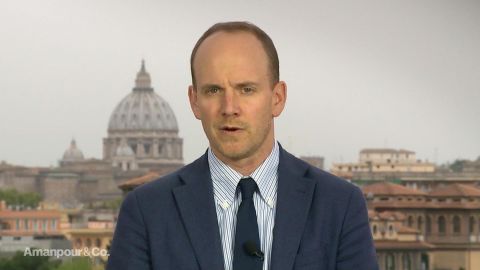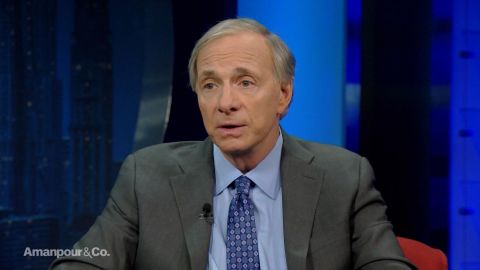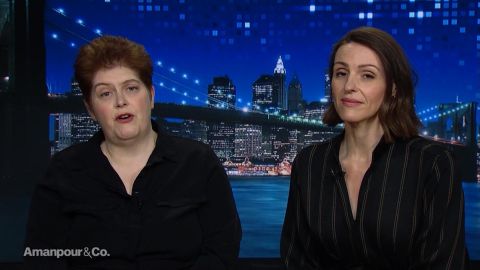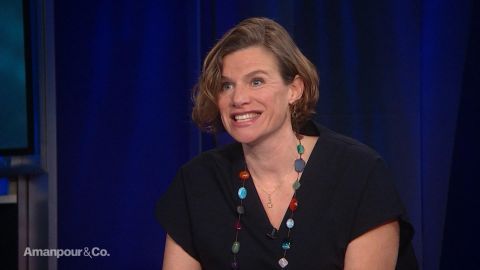Read Transcript EXPAND
WALTER ISAACSON: Ray Dalio, thank you for being with us.
RAY DALIO, FOUNDER, “BRIDGEWATER ASSOCIATES”: Thank you for having me.
ISAACSON: Why are you so worried about capitalism now? As a great capitalist yourself, you seem to always be worrying about where it’s going.
DALIO: Because I think it has to be sustained and work well, and I think it’s not working well for a large percentage of the population. So, history has shown that when there’s a big wealth, and I would say most importantly, opportunity gap, and there is an economic downturn, and you have to discuss how to divide the pie, there’s conflict, and it’s a risk to capitalism. It’s a risk to our system. I don’t think the system is working well for equal opportunity. I grew up in a middle-class, lower middle-class family, had two parents who loved me, took care of me. I went to a public school that was a good public school, and I came out and it was equal opportunity. And right now, there’s a problem. I divided the economy into two parts. The top 40 percent and the bottom 60 percent. And I looked at them differently, because picture gets lost in the averages. And on the bottom 60 percent, because that’s the majority of people, we have a problem, that income levels haven’t risen, so on. And I think we’re seeing it reflected in the polarity that’s existing in the election.
ISAACSON: If we have a huge wealth gap that’s growing and causing economic discontent and political discontent, should we have some form of a wealth tax?
DALIO: If you have a wealth tax, and you do it perhaps — this is now a very engineering question — if you do it, perhaps, like the Swiss do it, which has a small wealth tax to operate in a certain way, that might be totally fine. If you have a wealth tax that causes capital flows that hurt the country or changes productivity, this is important. So, I’m really approaching it like an engineer in trying to answer the question. Because I think that there’s a real risk that if you change taxes in a way that adversely affect capital flows or adversely affect productivity, you’re going to hurt the pie.
Another example would be, there’s — if you change income tax in a certain way, you will naturally have income tax compared with capital gains tax. And if you look at history, then those who — then they operate as a company, they incorporate. And now, you have a different tax rate as an individual and a company, and then you have those arbitrages and so on. Does that mean you raise corporate taxes?
My main point here is that to engineer a process by which you don’t — aren’t counterproductive for the whole, that you can make the whole grow, and you can make the whole grow if you, I think, realize that you’re looking for investment — what is the return on investment, not the budget. I think so many people pay attention to, are we balancing the budget, and it may be a town budget, it may be a country budget. And if business is ran that way, you would not have much in the way of improvement. The question is, are you producing a good return on investment? And a good example of that is education.
Yes, you could celebrate that you balanced the budget, but is it a good investment to have good education for the children? If you look at over what distinguishes one country from another country, in terms of its success, it’s largely making those good investments in education and infrastructure and those types of things to make the whole work better so I think that’s most important.
ISAACSON: Well, you’ve written a book with case studies on debt and how debt’s taken on. What principles would you use for the U.S. and for states taking on more debt?
DALIO: First of all, the – a very important distinction is whether the debt is in your currency or the foreign currency. In either case, you want to take on a debt that is going to produce an income or cash flow that is greater than the debt service. That’s a basic thing anywhere.
I think we need to do all-in accounting – in other words, let’s take education – and you have a budget problem. The difference between taking a high school student, and getting him through high school, in that student’s life for the society is about a million dollars over their lifetime, because they are at loss of income, because they’re in a position where they maybe are incarcerated.
It costs money to incarcerate them, because of different things. If you take in that all cost, and you were to say, “What does it cost to get a student, help them to get through high school and complete that,” it’s very little in relationship to that. So, I think we have to look at return on investment, in terms of thinking are those good returns on investment. I think it’s stupid not to have good education. It’s very costly. And so, I think that’s a good return on investment. And so, when I look at debt, I think, “Yes, what’s most costly is to not educate or to not make those changes,” then you pay a terrible price.
ISAACSON: When you look at the debt that the federal government’s now taking on, historically high, I mean, we’re running a huge deficit. Do you think that debt is being taken on wisely?
DALIO: I think it’s too much. When I do the calculations of what is the size of the debt, and then the productivity of the debt, will it produce a debt — an income that’s larger than its debt service capability. I think there’s a problem there. And I look at who are the buyers of the debt. I look at the supply-demand. And because we are have a world reserve currency, there is – it’s a privileged position that other countries and other savers around the world like to save in dollars. And that becomes a problem sometimes because that privilege can be abused, and so, it can get you into a position that’s difficult. We are now going to have to sell that debt to the rest of the world. And when we do, when I do the calculations, when we at Bridgewater do the calculations, we have a problem figuring out where all that debt is going to go because we look at the size of the portfolios of those who own it and want to buy it, and it would have to increase by a significant amount, the percentage of those portfolios. And right now, circumstances are such that it’s unlikely. They’re already overweighed with debt, so I think it’s going to be a supply-demand challenge.
ISAACSON: Do you think we may be heading into a recession soon?
DALIO: I don’t think you’re going to see like a 2008, ’09 financial crisis. The word recession, you know, the only thing it has in common is two negative quarters of GDP growth, right? There are big ones and there are little ones. I think that we have a situation in which we’re likely to – the world is likely to go into relative stagnation, very, very slow growth, in which central banks no longer have monetary power.
And that’s because you can judge the power of them to put on the gas and stimulate economy by the difference between where interest rates are and zero and the capacity to print money and buy financial assets and have them trickle through the economy. If we go around the world, Europe is at zero, and the ability to create credit that leads to buying power and pick ups the economy is very, very limited. Now, Japan is in the position, and the United States isn’t quite in that position, but the United State has a 2.5 percent interest rate, so it can go down 2.5 percent.
The average contraction, recession, required a 5 percent decrease in interest rates to pull it out. So we have 2.5 percent, and then we could do some quantitative easing, but we have a risk. And we have that same problem in Japan and the same problem in Europe. So, we’re at a point in the long-term debt cycle where there’s a challenge to be stimulative at the same time as we have this conflict between populists of the left and populists of the right.
ISAACSON: And if you have a slowing of the economy, and we’re almost 10 years into this business cycle, to what extent is that going to exacerbate the wealth gap and incite more of this populist backlash?
DALIO: Well, I think – history has shown this to be true, that if you have a large wealth gap and you have an economic downturn, people fight with each other about how to divide the pie. And that is something, I think, that risks what we’re – what we cherish, you know?
I think what we cherish is the – you know, is the fact that we work together and we have this American dream. And right now, the top one-tenth of 1 percent of the population’s net worth is about equal to the bottom 90 percent combined. So that’s a measure of quite an extreme difference in wealth.
And if you go back in time, the last time that happened was the late 1930s. So I think one of the lessons is that if you have that kind of situation and you have a downturn, you have a problem and it’s, you know, it’s the sort of problem –
ISAACSON: So you think we should look for ways to reengineer capitalism to make it more inclusive?
DALIO: Yes, and to make it — to bring about more of an equal opportunity that people feel that the system is fair and that makes it more productive.
ISAACSON: Other than investing in education, which you’ve talked about, what can you do to make capitalism more inclusive? What would you engineer?
DALIO: I’m involved, philanthropically, at looking at a number of things, and I do return on investment sort of calculations. And so, I find some things I support are things that support that, like microfinance. For every donation that I make to Green America, that’s particularly – but I donate it to other microfinance. For every dollar that I donate to that, they lend $12 over the next 10 years. That money goes around. They have a 90, almost a 99 percent, 98- point-something, repayment rate. So, that money comes in, and it gives an opportunity. It’s creating little entrepreneurs. You know, somebody borrowed $1,500. They buy a rug cleaning piece of equipment, and they’re in the rug cleaning business.
So, I find microfinance something that is something I like to support. I like to support the development of trade schools as they relate to jobs. There’s one situation where I found where there’s a company that works with community colleges and employers to make loans to students that are guaranteed that educates them a way that produces jobs.
ISAACSON: But how do you change the system so that philanthropy like that it’s necessary, that it’s built into the system of democratic capitalism?
DALIO: I think you need government dollars, and I think the best thing to do would be private-public partnerships., in which there’s a matching, you know, maybe philanthropic dollars or corporate dollars, with government dollars on those that are high return on investment, because it serves the purpose of being able to both vet the projects that you’re supporting and also being able to provide more money.
But I think the government has got to make assessments on return on investment, and I think if people get the notion and the government gets the notion that that’s a good investment and they pay attention to that, rather than it’s a budget – it’s not a balanced budget, that would help a lot too.
ISAACSON: Do you think –
DALIO: The key is not to make them unproductive. In other words, a lot of government programs can be unproductive, and then that’s costly.
ISAACSON: Do you think corporate leaders should care a little bit more about the whole notion of inclusive capitalism, rather than be as focused as they are on return on investment?
DALIO: I think it’s a shareholder question, not a management question. What I mean is the management reports to the shareholders.
ISAACSON: But you’re one of the biggest shareholders there are. Would you, as a shareholder, push your management to care about more than just pure return on investment?
DALIO: I think – I think there’s two questions. I think the two questions are, what my role is as an individual in my job as a fiduciary, I have a responsibility to do what my investors want me to do. And my investors are pension funds, endowments, foundations.
And they give me a goal to make investments along those lines and not favor a company that might devote more of its money to, let’s say, sales force, for example. It takes 1 percent of its profits and it gives it away. I do think that companies that do that are doing a good service, and I think it’s a good thing. I also think it’s very important for individuals, in each one of their jobs, to understand who’s responsible for making that decision. And that decision is made by shareholders.
ISAACSON: But a lot of people, Lawrence Fink and others, who run big funds are saying, we got to push the public interest a little bit more and even bring our investors around to that. You’re seeing a crisis in capitalism. You’ve been very worried about the crisis in capitalism. Don’t you think that you, with your Bridgewater platform, have a way to help push this?
DALIO: I’m very fortunate to be able to have these kinds of conversations with people of influence along those lines, and I do. I think – I just want to make clear that it’s their decisions. And if you’re going to do it, I think you can make them operate in a way which is better for the society and do it. But I think – I think it’s a complicated question.
Who do you give the money to? Do you take it from shareholders and how do you? I think we as a society need to do more of that. Corporations need to do that. But – so I’m in favor of ways of doing that, but I’m just wanting to make clear. Icould have the conversations, but it’s not my responsibility.
I think that the responsibility becomes either the populace is who you elect and what decisions they make and to do it in a way that’s economically productive, in achieving both the improvement in the issue of the wealth and opportunity gap and making productivity greater.
ISAACSON: Ray Dalio, thank you so much for being with us. Appreciate it.
DALIO: Thank you, Walter.
ISAACSON: Thank you.
DALIO: Thank you.
About This Episode EXPAND
Christiane Amanpour speaks with Mariana Mazzucato about the Green New Deal; Sally Wainwright & Suranne Jones about “Gentleman Jack;” and John Oschendorf about the key to repairing Notre Dame. Walter Isaacson speaks with Ray Dalio, who manages the world’s most successful hedge fund, about the widening wealth gap.
LEARN MORE



